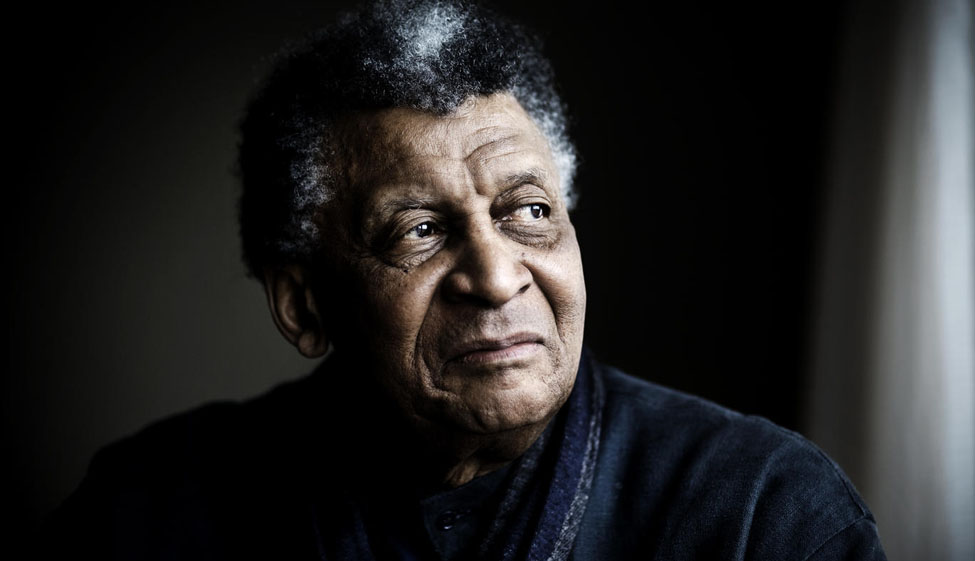Abdullah Ibrahim

Abdullah Ibrahim -The traditional and the modern, Out of this blend of the secular and the religious, developed the distinctive style, harmonies and musical vocabulary that are inimitably his own. The young Dollar Brand, as Abdullah Ibrahim became known, was exposed to American jazz, township jive, CapeMalay music, as well as to classical music, and Cape Town was a melting-pot of cultural influences of his childhood. Abdullah Ibrahim, South Africa’s most distinguished pianist and a world-respected master musician, was born in 1934 in Cape Town and baptized Adolph Johannes Brand. His early musical memories were of traditional African Khoi-san songs and the Christian hymns, gospel tunes and spirituals that he heard from his grandmother, who was pianist for the local African Methodist Episcopalian church, and his mother, who led the choir.
Beginning with piano lessons at the age of seven Abdullah Ibrahim made his professional debut at fifteen, then later recording with such local groups as the Tuxedo Slickers. Being in the forefront of playing bebop with a Cape Town flavour and 1958 saw the formation of the Dollar Brand Trio. Groundbreaking septet the Jazz Epistles, formed in 1959 (with saxophonist Kippie Moeketsi, trumpeter Hugh Masekela, trombonist Jonas Gwanga, bassist Johnny Gertze and drummer Makaya Ntshoko), recorded the first jazz album by South African musicians. That year, he met and first performed with vocalist Sathima Bea Benjamin; they were to marry six years later.
Defying the increasingly strict apartheid laws, mixed-race bands and audiences were jazz symbolized resistance, so then government closed a number of clubs and harassed the musicians, after the notorious Sharpeville massacre of 1960. Members of the Jazz Epistles went to England with the musical King Kong and stayed in exile. Difficult times it was in which to sustain musical development in South Africa. Imprisoned with Nelson Mandela in 1962, the ANC banned him along with Dollar Brand and Sathima Bea Benjamin. Later they were joined by the other trio members Gertze and Ntshoko, and took up a three-year contract at the Club Africana in Zürich. Sathima persuaded Duke Ellington to listen to them play in 1963, which led to a recording session in Paris – Duke Ellington presents the Dollar Brand Trio – and invitations to perform at key European festivals, and on television and radio during the next two years.
In 1965, the now married couple moved to New York. At the Newport Jazz Festival and Carnegie Hall, Dollar Brand was called upon in 1966 to substitute as leader of the Ellington Orchestra in five concerts. They followed a six-month tour with the Elvin Jones Quartet. He received a Rockefeller Foundation grant to attend the Juilliard School of Music, in 1967. When he was in the USA , the opportunity to interact with many progressive musicians,afforded him including Don Cherry, Ornette Coleman, John Coltrane, Pharaoh Sanders, Cecil Taylor and Archie Shepp.
A turning point was in 1968, Dollar Brand went back to Cape Town, searching for spiritual harmony in an increasingly fractured life where he converted to Islam taking the name Abdullah Ibrahim, and making a pilgrimage to Mecca in 1970. Reinforcing the spiritual discipline he further found music and martial arts. Based in Swaziland for a couple of years, a music school was founded. Abdullah Ibrahim and his young family returned in 1973 to Cape Town, though he still toured internationally with his own large and small groups. In 1974 he recorded “Mannenberg – ‘Is where it’s happening’”, which soon became an unofficial national anthem for black South Africans. After the Soweto student uprising, in 1976, he organized an illegal ANC benefit concert; before long, he and his family left for America, to settle once again in New York.
The 1980s saw him involved with a range of artistic projects that depended on his music: Garth Fagan’s ballet Prelude (first performed 1981), the Kalahari Liberation Opera (Vienna, 1982), and in 1983 a musical, Cape Town, South Africa, featuring the septet he formed that year, Ekaya. Determined to manage his own affairs in America, he founded with Sathima, the record company Ekapa in 1981. In 1987, he played a memorial concert for Marcus Garvey in London’s Westminster Cathedral, and the following year he played at the concert in Central Park, New York, commemorating the seventieth birthday of Nelson Mandela.
In 1990 Mandela, freed from prison, invited him to come home to South Africa. The reacclimatizing of fraught emotions there are reflected in Mantra Modes (1991), the first recording with South African musicians since 1976, and in Knysna Blue (1993). He memorably performed at Mandela’s inauguration in 1994.
Abdullah Ibrahim has been the subject of several documentaries: for instance, Chris Austin’s 1986 BBC film A Brother with Perfect Timing, and A Struggle for Love, by Ciro Cappellari (2004). His composed scores for film including the award-winning soundtrack for Claire Denis’s Chocolat (1988), as well as for No Fear, No Die (1990) and Idrissa Ouedraogo’s Tilai (1990), and he was featured in the 2002 production Amandla: A Revolution in Four-Part Harmony.
Appearing at major concert halls, clubs and festivals, giving sell-out performances, for more than a quarter-century he has toured the world extensively as solo artist or with other renowned artists (notably, Max Roach, Carlos Ward and Randy Weston). Collaborations with classical orchestras have resulted in acclaimed recordings, such as African Suite (1999, with members of the European Union Youth Orchestra), which also featured the trio and the NDR Jazz Big Band and the Munich Radio Philharmonic orchestra symphonic version, “African Symphony” (2001).
Most recently, in 2006, he spearheaded the historic creation (backed by the South African Ministry of Arts and Culture) of the Cape Town Jazz Orchestra, an eighteen-piece big band, which is set to further strengthen the standing of South African music on the global stage. When not touring, he now divides his time between Cape Town and New York. He started a South African production company Masingita (Miracle) and established a music academy, M7, offering courses in seven disciplines to educate young minds and bodies, in addition to composing and performing.
His discography runs to well over a hundred album credits. Abdullah Ibrahim celebrated his seventieth birthday in October 2004, which marked the release of two CDs by Enja Records (the Munich-based label with whom he has recorded for three decades): the compilation A Celebration and Re:Brahim his music remixed by occasion.
He takes every opportunity to visit his master in private trips to Japan, a martial arts Black Belt with a lifelong interest in zen philosophy. In 2003 he performed charity concerts at temples in Kyoto and Shizuoka, the proceeds going to the M7 academy.
At his zenith Abdullah Ibrahim remains , as a musician and a tireless initiator of new projects. In his own words:
“some do it because they have to do it
we do it because we want to….so we do not require much sleep…
so we have to do it “
The recipient of many awards and honorary doctorates, spiritually strong as both teacher and disciple, Professor Abdullah Ibrahim is a true inheritor of the ancestral name SENZO.
